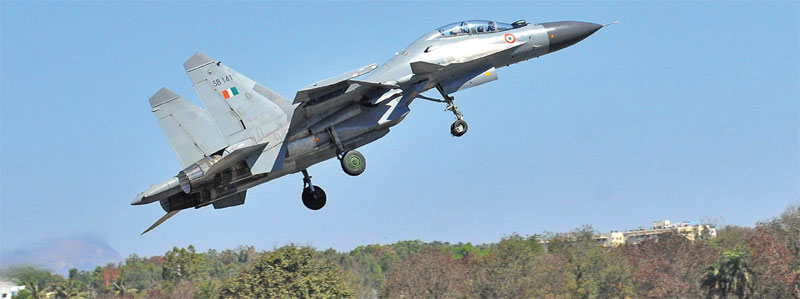UAC commits to fighter’s upgradation in India with indigenous components
Smruti Deshpande
The Indian Air Force (IAF) is in the process of upgrading its Sukhoi-30 MKI fleet. The United Aircraft Corporation (UAC), the state-owned Russian corporation, told the press during Aero India 2023 that work for this was ongoing and that the UAC had just defined the technical specifications. The UAC, together with India’s Hindustan Aeronautics Ltd (HAL), will take up the upgradation. The process will take place at the HAL’s facilities. Talking to the media during Aero India, UAC director general Yury B. Slyusar said that one of India’s major requirements in the upgrade programme was that they take place within the country.

When the Sukhois were initially supplied to India, they were manufactured by the Irkut Corporation. Slyusar said the corporation introduced new solutions into the aircraft while undertaking upgrades as well as new air weapons. However, the current additions into the Sukhois will be indigenous and in compliance with the IAF’s requirements. Slyusar did not divulge the engine options that the UAC would offer India in the upgrade programme.
While the MiG Corporation and Irkut Corporation have been merged into UAC, Ilyushin and Tupolev-214 will be merged into UAC in the next phase. This is being done to provide optimisation of business processes, expenditures and the quantity of personnel, which will lead to greater efficiencies.
Owing to Russia’s invasion of Ukraine, activities on the Medium Transport Aircraft (MTA) were suspended. Regarding the MTA, Slyusar said, “We spoke not just about the production and supply but joint development as well. We had a meeting with an Indian corporation (HAL) in this regard. In my view, the aircraft should be produced and supplied together. The competencies which might be developed during the design and development phase is an invaluable part of any project and we think that it might be of use to the Indian side to perform the joint development of those aircraft which might be for the good of both the countries.” The Ilyushin company is involved in this.
Regarding the potential of delivering the Su-57 aircraft to India, Slyusar said the UAC was interested in supplying these aircraft to foreign customers, including India. “I would like to underline here that the fifth-generation aircraft’s joint development means the transfer of technologies will take place in such a way that no other country can be expected to deliver the same. We are ready to share the state-of-the-art aviation platforms with the Indian side,” Slyusar said.
Furthermore, the UAC is keen on offering India civil aircraft. The UAC has proposed to manufacture the Sukhoi Superjet in India and is already in talks with the HAL. During the brief press meet, Slyusar said, “At present in Russia, we are manufacturing the Russian version. It doesn’t have any foreign components including the avionics, engines, and systems. But we will offer Indian partners the facility to assemble the Sukhoi Superjet with foreign components within India with international technical specifications.”
Speaking about why the aircraft suits Indian requirements, he said, “We know about the programme of local and regional transportation of India, Udaan. We think that the 100-seat aircraft—the Superjet—complies with Indian requirements. The Superjet remains a modern aircraft at present that is why we suggest manufacturing the aircraft in India.”
When asked about the payments issue between Russia and India following the western sanctions against Russia, he said, “We would like to say that we are grateful to the ministry of defence colleagues including the finance people from the ministry as they have been putting in a lot of effort in resolving this non-simple situation.”
He said despite the difficulties regarding the money and transactions, the Russian side was fulfilling all its commitments on supply, service and maintenance of the aircraft in full.
On whether western sanctions have hit Russia hard, Slyusar said, “The sanctions which were imposed on us relate to a wide number of items. We cannot deny that there are no problems [that we have been facing] with those sanctions. But we are relying on self-sufficiency as defined by our government. We have started an import replacement programme.”

